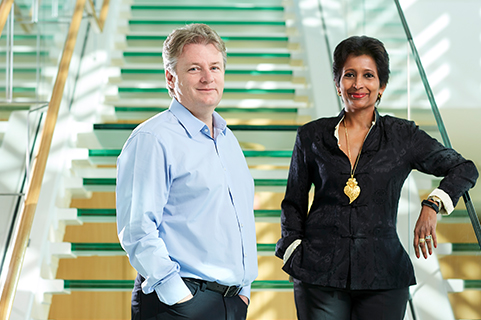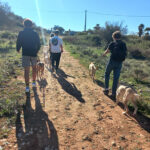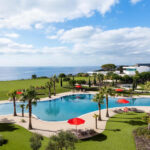By Sophie Sadler
Businesswoman Chitra Stern gives a special interview for Tomorrow readers about her life and career.
Entrepreneur Chitra Stern is one half of the power couple between the Martinhal Family Resorts chain. With an eye-watering list of qualifications, awards and a property empire, the latest string to her bow is an innovative new education hub in Lisbon.
I first met Chitra in 2003, when she was building the first phase of the Martinhal resort in Sagres. The western Algarve was not even fully accessible by motorway back then and, everyone said a development more than an hour from an airport would fail.
As the recipient of the prestigious Deloitte Institute Accomplished Entrepreneur Award at the London Business School, Person of the Year Award by the International Family Travel Association and the Family Traveler Award for special contribution to the Family Travel Market, Chitra has undoubtedly proved doubters wrong. In the process of building her empire, she also had four children. It’s certainly invigorating to talk to such a successful career woman but it does leave you feeling slightly inadequate!
Owner and founding board member of Martinhal Family Hotels & Resorts, Chitra’s LinkedIn page describes her as “a passionate entrepreneur”. After over an hour’s conversation with her I would concur with this description, enthusiasm exudes from her every pore. When trying to figure out how she succeeded, while so many arriving here have failed, I concluded that it is an extraordinary self-belief. This is not to be confused with arrogance, she is far too nice, but she set out to become an entrepreneur and never doubted she would succeed.


Chitra qualified as an Electronics Engineer from the University of London but then worked for PricewaterhouseCoopers for six years, where she met her husband and business partner Roman Stern. Swiss-born Roman had studied Real Estate at Harvard so had a background in property before becoming a management consultant. In 1998 Chitra went to London Business School to study for an MBA. After graduating, she and Roman got married.
From this point, the stage was set for them to start their own business and Chitra tells me they were regularly reviewing business opportunities, writing plans and seeking out venture capital. They piloted business ideas and were involved with an early version of Uber Eats before taking on a hotel project in Ireland for Swiss Investors.
While this did not bring them the success they craved, the Boutique Hotel in Cork taught them some valuable lessons that would contribute to the future success of the Martinhal Group. It was the same Swiss and German investors who invited Roman to Carvoeiro to view a potential investment opportunity. “I still remember his phone call to me from Portugal. He was blown away by the beauty of the area and its potential as one of the last undiscovered areas of western Europe.”
At that time Chitra was involved in a project which meant she would end up working in India while Roman was in London and they saw an opportunity for business and a better lifestyle.
“We bought a house in Lagos for the same price as a broom cupboard in London; we just had this sense that Portugal was about to boom. They had just joined the EU which had created a new spirit, Lisbon had hosted Expo, the motorway was in the process of being completed to the Algarve, Faro airport had just doubled its capacity. In terms of macroeconomics, all the signs were there.”
Chitra and Roman established their empire from their garage in Lagos, completing due diligence on a number of investment opportunities. “Everyone was focused at that time on the eastern Algarve, with our budget as new investors, we had to look away from the prime areas.”
By 2001, Chitra was pregnant with her first child and she knew they had to make up their minds to allow her to start work on the project before she gave birth. Most mortal women may have been tempted to start knitting booties but Chitra fell in love with Martinhal, located on the beach in Sagres.
At that time it was certainly not on the tourist trail but their research had found a gap in the market for a managed resort with integrated hotel-style facilities like a heated pool. “So we planted our flag in Sagres.”


Martinhal had planning and a basic infrastructure but was crying out for a new direction and several pieces fell into place for the dynamic couple. “Managed ownership was a big theme at the time, which allowed lifestyle investors to purchase a unit which was managed and rented out by the resort. The new law which created a category for this was Aldeamentos Turisticos (or Touristic Villages), a structure intended to support properties created for touristic enterprises.”
Their vision, which never faltered, even in the equity crash, was to keep up the high quality and they started to build and sell the first phase. During this downturn, they were saved by two clauses they had cleverly thought to put in the contracts. The buyers paid high deposits of 25% and they weren’t allowed to “flip” the unit to another buyer before it was completed.
They managed to pay back the bank with monies paid on completions and injected more equity to keep the project afloat, “we managed to hold on for dear life”. As a result, they continued to have good relationships with the banks and lenders as they never reneged on a payment.
Chitra describes how they emerged from this period. “It was with persistence, resilience and grit.”
They developed the Martinhal Resort in Sagres in the Algarve from scratch and came up with the USP of being a family resort which still delivers on quality. They researched many of the ski hotels in Roman’s home country where they delivered excellent customer service for families. Their own experiences also shaped the resort. “As parents you know that your kids take five minutes eating their meal then want to leave the table but the adults crave a relaxed dining experience, so we created a kids corner with staff to entertain the children.” Their restaurant developed the concept of “Little gourmet” where the adult food was sold in smaller portions for kids or puréed for babies.
At that time Sagres was not on the list for tour operators so they invested a lot in public relations, inviting travel journalists to stay and discover the region’s benefits. Chitra herself started their first Google Ads campaign. “Coming from a background in electronic engineering, I guess I just didn’t feel any fear at experimenting with new methods of marketing and tech. We developed a marketing engine to feed the resort.”
They have now successfully expanded the Martinhal brand across two other properties in Lisbon and Cascais and relocated their family to the capital. The lessons learnt in Cork led to this expansion. “Hotels are about economies of scale, which is why we expanded the Martinhal brand in Portugal. In order to deliver such high quality, particularly in HR, it is important to have a chain which allows personnel to relocate when they want a change and not lose someone you have invested in and who can deliver service at such a high level. You also need to offer repeat customers alternative destinations in Portugal.”
Between 2017 and 2019, Chitra was on the Committee of Portugal IN, a special task force created by the Portuguese Prime Minister’s office to enhance foreign Direct Investment into Portugal (www.portugalin.gov.pt). She is also an invited professor for Luxury Marketing at the Nova School of Business and Economics and has the current mandate as the President of the Entrepreneurs Organization (www.eonetwork.org) in Portugal.
It was while she was doing a SWOT analysis for the Portuguese government on how they encourage foreign investment into Portugal that she discovered a major impediment. She was working on encouraging the European Medical Agency to relocate to Lisbon post Brexit, when she found that their personnel would require 850 school places in international schools and they didn’t exist.


Ever the entrepreneurs, Chitra and Roman were looking for a way of diversifying away from tourism and were looking for other development sites for commercial, real estate and education. They found an abandoned premises, previously owned by the university in Lisbon, between the Park of Nations and the airport and saw an opportunity.
The school United Lisbon International School opened in September and is part of a wider Edu Hub working with innovators, tech companies and an academy that all have something to contribute to education. The school is a K-12 International School with an American-based Curriculum and IB diploma. It is operated by International School Services from Princeton, NJ. “Obviously the school has been shaped by my experiences as a mother, but I want to get away from the concept of schools being a bubble and create shadowing and internship initiatives and to create young adults who are problem solvers.”
Having survived the equity crash how is Chitra looking to survive one of the toughest challenges to hit the travel industry? Despite admitting their occupation levels had dropped by 75%, she seems unphased and is searching for the new opportunities that will come. “I have certainly spoken to international parents who are relocating to Lisbon because of our school. We now need to chase the new market that is emerging for digital nomads who come here for the golden visa or to escape Brexit. There are great opportunities for residential and educational tourism if we look beyond the holiday market.”
As a result, the Martinhal newsletter is encouraging clients to use their rooms for longer stays, while they seek Portuguese residency. The school already has 140 children with 20 different nationalities and she is already thinking of turning over some of their hotel rooms to students.
So what, in Chitra’s opinion, are the prospects for budding entrepreneurs like her? “We have so many under-utilised industries in Portugal like wine and agriculture. I also see a huge potential to encourage people here with tech visas to work in AI.”
This passionate entrepreneur is genuinely a case study in how determination can pay off. She was an early pioneer of the western Algarve but watch this space as I am sure she will make many new discoveries on her career path.
+INFO:
www.unitedlisbon.school
www.martinhal.com
To hear more Chitra Stern´s experiences of living in Portugal as a foreigner and doing business as well as how Portugal has fared in the pandemic – view her Live Talk “The Portuguese Miracle – Why Portugal will be even more popular in the post-COVID world.” She also discusses the future in the #postcovidworld for foreign investment in Portugal.













